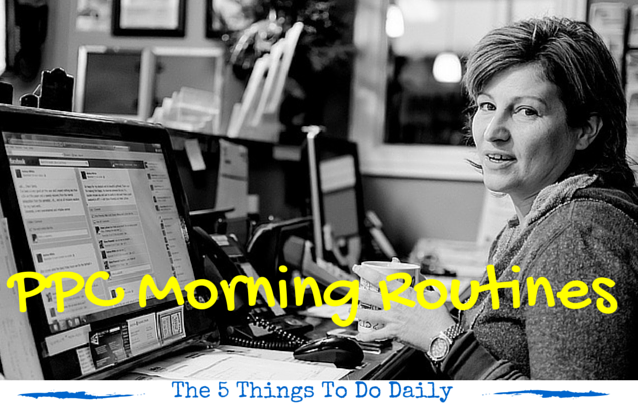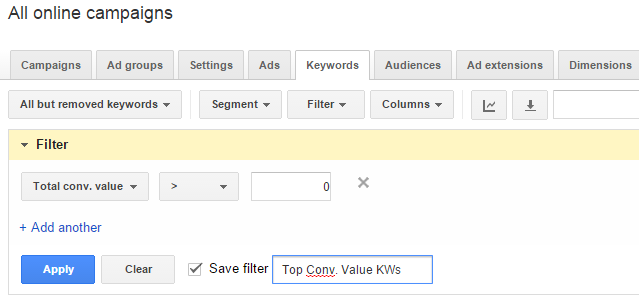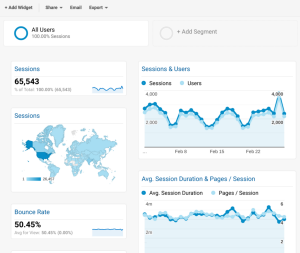Robert Brady is the head PPC wizard at Righteous Marketing, a Google AdWords Certified Partner and Microsoft adExcellence Member. He manages PPC accounts for both small and large businesses and offers a PPC training program for the DIYer.
In the PPC industry I come across a lot of really smart people. Some are amazing at building and managing a large team. Others are exceptional analysts capable of spotting trends in data that you though was about as clear as muddy water. Still others are amazing tacticians who constantly push the limits of every feature to find how to get even more performance.
No matter what type of PPC manager you are or what type you aspire to become, there is one underlying principle that I have found to be true regardless of the skill set or personality type:
“A great PPC manager is simply a good PPC manager, every day.”
With this in mind I present the 5 things that good PPC managers do in the morning.
1. Plan Your Day
In the digital workplace we’re bombarded with emails, texts, chats, notifications and so many other demands on our attention. These can easily eat your entire morning or day if you’re not careful.
To guard against this I recommend planning your day. If possible, do this before you turn on your computer or look at your mobile device. For some people that will mean a paper and pen to write out a quick checklist (my preferred method actually). You might also use software like Basecamp or Trello to manage your workflow. The key is that you’re creating a list of the highest priority items that need your attention that day.
Like any habit, it takes discipline. I know it’s hard some days when you just want to jump in, but it’s worth it.
2. Check Spend & Budget
I have met few PPC advertisers with truly unlimited budgets. Therefore, the majority of you PPC managers are working with a budget of some type. This is something that should be looked at on a daily basis.
Now you may be saying “It takes too much time to look at my spending across all channels.” Well, then it’s time for you to get some help. Acquisio is a great platform for larger clients/agencies to have multiple platforms and accounts viewable in one place. If you’re a single company, a new up-and-coming platform is AdStage. I’ve been demoing their product and it easily brings in AdWords, BingAds, LinkedIn, Twitter & Facebook into a unified dashboard.
The takeaway here is that you need to look at this. You can log into each platform and use the native interfaces or you can use a software to help. Heck, you could get a VA to do it each night. The point is that it’s a high level stat you need to pay attention to.
3. Check Performance
This will inevitably be tied to checking spend/budget, but it is a different beast. Of course you should be pacing your budget and watching the ebbs, flows and spikes, but performance is more about seeing how efficiently those dollars are being utilized. Some specific metrics you could look at include the following:
- Cost/conversion (CPA)
- Conversion rate
- Average Order Value (AOV)
- Total revenueThere are too many to list them all, but ask yourself these types of questions. Is it higher or lower than (February 22, 2015)? The same day last week? Same day last year? How does it compare to the average? This helps you understand the data in context and know which way the needle is moving.
- The Real Cost Of Adwords ” 6 Calculations You Need To Know
4. Look For Outliers
If you haven’t read Outliers by Malcom Gladwell, I highly recommend it. The principle I’m borrowing from the book is this: you want to look for really high and really low performers because they can expose weaknesses and strengths that can be exploited.
Depending on how much time you have, this could be done at an ad group level, a keyword level, an ad level, etc. You want to find the outlier and then ask “Why is the performance here so drastically different than the past/other similar items?” The answers to the why questions will give you direction on what action to take next.
For example, in AdWords you can set up and save filters. Below is an example filter that will show keywords (notice that’s the tab I’m on) that have conversion values greater than 0. Basically, that’s all revenue generating keywords for the previous day. Once I’ve sorted that highest to lowest I can see what keyword let to the most sales for the previous time period.
Since I saved the filter, I can select it from the Filter drop down each day without having to reconfigure it.
- 5 Steps to Improve your AdWords Account in 5 Minutes
5. Monitor Industry News
This one is a little more abstract, but it can keep you one step ahead of your competitors. I’ll illustrate with an example. Let’s say you’re a travel company that offers tours to Cuba. Imagine the impact of an announcement like this one on December 17th last year, where President Obama discussed normalizing relations with Cuba.
- That could significantly alter the amount of searches being done that day and if you’re not ready it would burn up your budgets in a couple hours. To make this easy, create Google Alerts for key keywords in your industry and have them sent to your inbox. Then add a filter so they go directly to a folder (don’t want to clutter the inbox worse than it already is). Each day you just pop into the folder and a quick look will keep you on top of any big news that could spike volume.
- How I Use Feedly, Pocket, and Evernote to Sort Through 1000s of Articles and Posts Each Day
Conclusion
Doing the small things every morning keeps you on the right track and alerts you quickly when you’re deviating so you can adjust. This makes the life of the PPC manager a lot more manageable. What do you do every morning?
*Leader image with photo by Photography by Servando Miramontes
(304)








